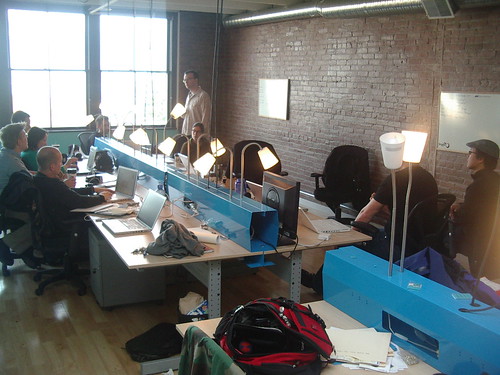It’s going to be a full-tilt sprint until the end of term, and among the tasks on my docket this week is writing 500 words for media consumption on immersive spaces such as Second Life — always fun to write in a state of near-complete ignorance. But I can’t resist pointing at this short piece poking at that great guru Tom Friedman, a somewhat more literal version of the arguments made by Norm Friesen last week:
The meeting was entitled “A Flattened World Hits Home” and billed as an effort to apply the lessons of author Thomas Friedman’s free-trade bible, “The World Is Flat,” to the rural outpost of Montana. Friedman himself could not be there, the panel moderator told us – the town couldn’t afford his $75,000-a-speech fee and first-class plane ticket. But we would just watch a video of a recent lecture the author had given.
[snip]
…As the New York Times columnist rattled off the wonders of technology – “Isn’t Linux great?” “Wireless is the steroids of the flat world” – the group was dead silent as it listened to an enthusiastic and joyful Friedman telling the story of how, thanks to a “flat” world brought on by America’s “free” trade policy, our country’s workers and small businesses must now compete with slave labor and desperate conditions in places like China and Bangladesh.
Then it was time for panel discussion. How would our community deal with the “flat world” that Friedman gushed about?
[snip]
…All said exactly what Friedman said at the end of his videotape: “Kids need to learn how to learn” in order to compete in the “flat world.”
Sadly, the hard data tells us that, as comforting as this Great Education Myth is, we cannot school our way out of the problems accompanying a national trade policy devoid of wage, environmental and human-rights protections.
As Fortune Magazine reported last year, “The skill premium, the extra value of higher education, must have declined after three decades of growing.” Citing the U.S. government’s Economic Report of the President, the magazine noted that “real annual earnings of college graduates actually declined” between 2000 and 2004. The magazine also noted that new studies “show companies massively shifting high-skilled work — research, development, engineering, even corporate finance — from the United States to low-cost countries like India and China.”
It’s not that workers in these other countries are smarter, says Sheldon Steinbach of the American Council on Education. “One could be educationally competitive and easily lose out in the global economic marketplace,” he told the Los Angeles Times. Why? “Because of significantly lower wages being paid elsewhere.”
Pundits, such as Friedman and the Washington policymakers who follow him, see the data and understand this reality, and yet continue preaching their “free” trade fundamentalism to the delight of corporate lobbyists whose clients’ profits are expanding under the status quo.
Is it fair to describe Friedman as a “free trade fundamentalist“?
During a CNBC interview with Tim Russert in late July, the acclaimed savant made a notable confession: “We got this free market, and I admit, I was speaking out in Minnesota — my hometown, in fact — and guy stood up in the audience, said, ‘Mr. Friedman, is there any free trade agreement you’d oppose?’ I said, ‘No, absolutely not.’ I said, ‘You know what, sir? I wrote a column supporting the CAFTA, the Caribbean Free Trade initiative. I didn’t even know what was in it. I just knew two words: free trade.’”
Friedman’s ignorance extends past the contents of this agreement — it is the Central American Free Trade Agreement, not the Carribbean.
Oh yeah, he’s also the worst sort of warmonger, as blithe about collateral damage as he is about displaced workers and declining wages (and he’s consistently wrong too — see here, here and here). But if I go into that, I’ll be here all day.






